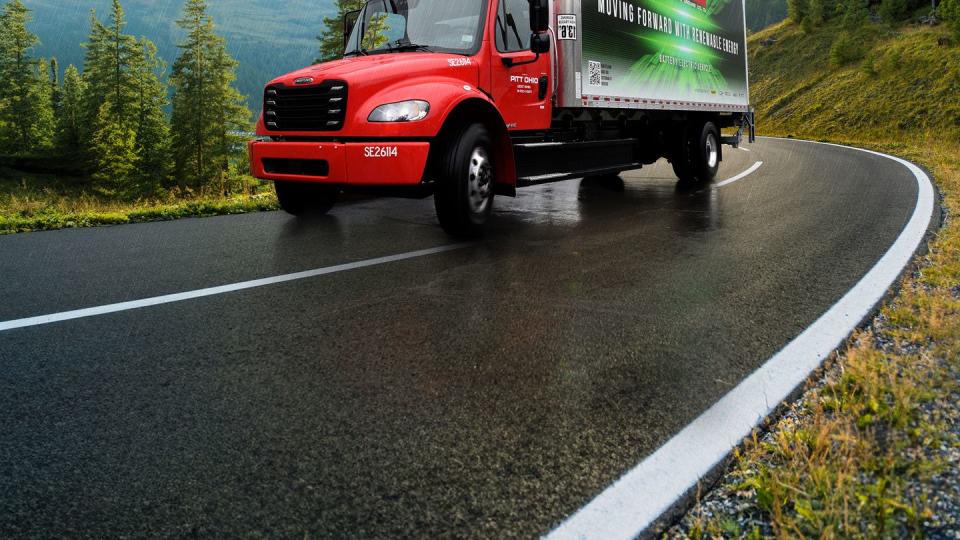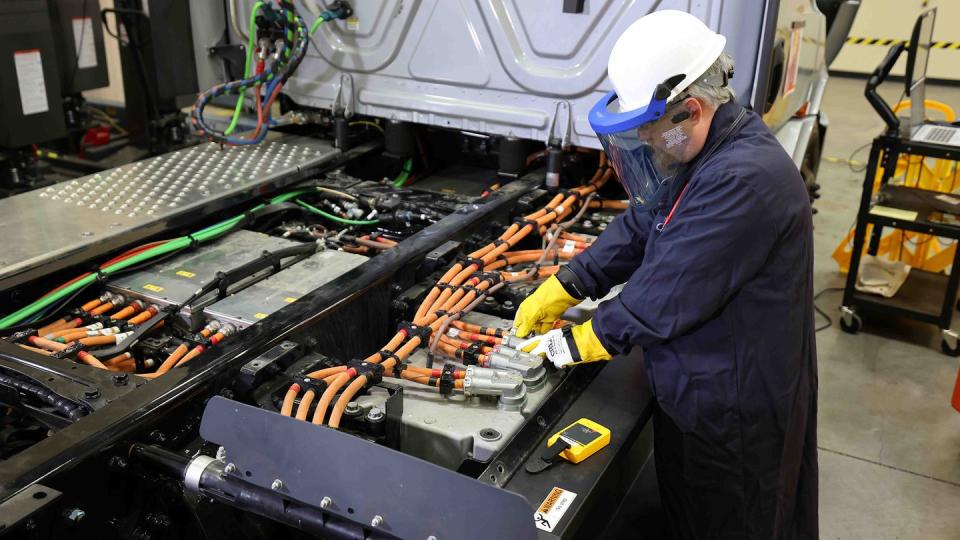How One Truck Manufacturer Will Address the Battery Issue

Daimler Truck North America (DTNA) readies battery repair and recycling programs to address issue of spent or damaged EV batteries.
The truck maker plans to create a closed loop for repairing, repurposing, or recycling heavy and expensive batteries meant for large trucks.
The industry has been working to address the issue of battery material extraction before a major wave of older EVs begins to retire, which is predicted to create a significant need for material reuse.
Electric trucks are a blip on the radar when it comes to annual sales, but Daimler Truck North America (DTNA) is already planning for the day when their batteries will need to be replaced or repaired.
Indeed, with the mileages that even regional delivery trucks will rack up, covering well over a hundred miles a day, the issue of battery replacement and recycling will soon be a major one, not only due to their size but also their cost.
To address this, the truck maker plans to create a circular economy not only by recycling batteries when they reach a certain stage of degradation, but also remanufacturing and repurposing them.
"Our primary goal is to repair our lithium-ion battery materials and reduce the consumption of new resources," said Rakesh Aneja, vice president and chief of Zero-Emission Transformation Group at DTNA.
This first approach, when a battery needs more than a simple repair, is to remanufacture it via partial disassembly and module replacement—a procedure that certainly sounds expensive when it comes to passenger EVs. But given the size and cost of truck batteries, it will be economical to repair rather than replace batteries that develop issues.
Detroit Diesel Remanufacturing already has locations in the US where truck batteries can be disassembled and repaired, DTNA points out, instead of being discarded or recycled, thus saving money for fleet owners and conserving resources. This goes not only for batteries, but also for eAxles produced by Detroit Diesel.
When a battery's maximum state of charge has degraded to a certain level, it can be repurposed, often for a static battery energy storage system (BESS).

To this end, Daimler has teamed up with Nuvation Energy to create a prototype battery energy storage system, which we are already starting to see being paired with charging plazas to reduce reliance on the grid.
"As the number of EVs on the road increases, the existing grid capacity may struggle to meet charging demands," Aneja adds. "Energy storage systems alleviate this issue by facilitating off-peak charging, utilizing stored power when needed, and reducing reliance on the grid."
It's safe to say that we're still in the early days of BESS being commonplace, but DTNA and several other automakers have been experimenting with such systems for some time, mostly on a smaller scale meant for charging hubs.
When truck batteries cannot be repaired or repurposed, usually just one option remains, and that's recycling and recovering their materials, thereby creating a closed loop.
Daimler has partnered with lithium-ion battery resource recovery company Li-Cycle to use an environmentally friendly liquid-based method to recover up to 95% of the critical materials within a battery pack. These are formally called hydrometallurgical operations, but this process must also focus on not using and discharging excessive amounts of water.
The truck maker is the latest to take steps toward creating a circular economy when it comes to battery-electric vehicles, as manufacturers look for ways to play a more meaningful role in how raw materials are acquired and reused in their vehicles.
In a few years, as the oldest EVs on the road approach the end of their life cycles, there is expected to be a wave of battery recycling needs, and this is what EV makers are now trying to get ahead of.
As the oldest examples of the Tesla Model S, for instance, are just over a decade old, there isn't a major push to address battery recycling on a large scale just yet. But in a few more years, this is expected to become a much more acute problem, and also a key industry.
Will we see commercial trucks go electric in significant numbers in the second half of the decade, or will this occur on a large scale only in the 2030s and later? Let us know what you think in the comments below.

 Yahoo Autos
Yahoo Autos 